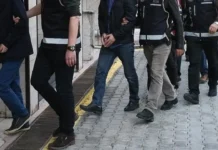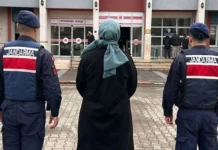Kyrgyzstan on Tuesday called on Turkey to return educator Orhan İnandı, who was abducted by the Turkish Intelligence Agency (MİT), and take all necessary measures to ensure that he is treated properly in accordance with international law, Kyrgyz media reported.
Ahmet Sadık Doğan, the Turkish ambassador in Bishkek, was summoned on Tuesday by Kyrgyz Foreign Minister Ruslan Kazakbaev upon an order from President Sadyr Japarov. Doğan was also handed an official note of protest denouncing the abduction of İnandı.
According to an official statement, the Kyrgyz foreign minister said such actions are unacceptable and grossly violate the principles and norms of international law, human rights and freedoms enshrined in the Universal Declaration of Human Rights and the International Covenant on Civil and Political Rights.
İnandı, the founder and president of the Turkish-Kyrgyz Sapat school network operating in Kyrgyzstan, went missing on May 31 and was feared to have been abducted by MİT due to his alleged links to the Gülen movement, a faith-based group inspired by Muslim cleric Fethullah Gülen.
Ambassador Doğan, on the other hand, argued that İnandı is a citizen of Turkey and is recognized exclusively as a Turkish national, noting that Turkey has not acknowledged that the operation was conducted on Kyrgyz soil.
Turkish President Recep Tayyip Erdoğan on Monday acknowledged that İnandı was abducted by Turkish spies and brought to Turkey, praising their efforts in the rendition.
Photos of İnandı in handcuffs with Turkish flags prompted allegations of torture due to İnandı’s visible weight loss and swollen right hand.
İnandı’s wife, Reyhan, said photos showing her husband in handcuffs exposed the torture he has undergone. “It’s obvious they tortured my husband. He has lost so much weight,” she said.
Reyhan İnandı said the photos of her husband flanked by Turkish flags was announcing the torture to the world, labeling the affair “a disgrace for Turkey.”
Speaking after a cabinet meeting on Monday, President Erdoğan vowed that his government would ensure that Gülen movement members will find no safe haven wherever they go.
Touting MİT’s previous operations in rendering Gülen movement members from around the world, Erdoğan said it was not always possible for him to share information about these operations with the public due to the “nature” of the matter, acknowledging that more than 100 Gülenists have been rendered to Turkey from various countries.
Erdoğan has been targeting followers of the Gülen movement since the corruption investigations of December 17-25, 2013, which implicated then-Prime Minister Erdoğan, his family members and his inner circle.
Dismissing the investigations as a Gülenist coup and conspiracy against his government, Erdoğan designated the movement as a terrorist organization and began to target its members. He intensified the crackdown on the movement following an abortive putsch on July 15, 2016 that he accused Gülen of masterminding. Gülen and the movement strongly deny involvement in the coup attempt or any terrorist activity.
MİT has intensified its efforts to target dissidents abroad. Most recently a nephew of Fethullah Gülen living in Kenya was arrested by Turkish operatives and brought back to Turkey, the state-run Anadolu news agency reported.
In a joint letter UN rapporteurs accused the Turkish government of engaging in the systematic practice of state-sponsored extraterritorial abductions and forcible returns to Turkey, with at least 100 Turkish nationals from multiple states including Afghanistan, Albania, Azerbaijan, Afghanistan, Cambodia, Gabon, Kosovo, Kazakhstan, Lebanon and Pakistan removed to Turkey.
In a number of cases the UN Working Group on Arbitrary Detention (WGAD) concluded that the arrest, detention and forced transfer to Turkey of Turkish nationals were arbitrary and in violation of international human rights norms and standards.
A recent report by Freedom House on global transnational repression also revealed the intensity, geographic reach and suddenness of the Turkish government’s campaign targeting dissidents abroad, noting that Turkey has become number one among countries that have conducted renditions from host states since 2014.
According to recent official statements by its interior ministry, Turkey has sent 800 extradition requests to 105 countries since the attempt, and more than 110 alleged members of the movement have been brought back to Turkey as part of the government’s global campaign.















